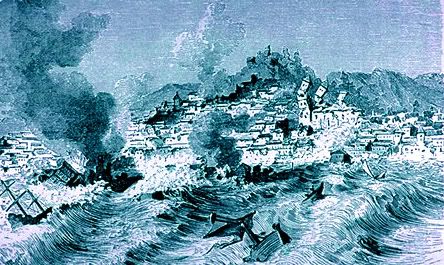I suppose I ought to say something about Japan's agony, but it is the sort of thing that leaves even people much wiser than me groping for meaning. So arbitrary; capricious; undeserved.
The 1755 earthquake that destroyed Lisbon and killed an estimated 30,000 people occurred on All Saints Day, one of the holiest days in the Catholic calendar. Besides the loss of life and devastation of the city (as well as elsewhere in Portugal), it prompted Europe-wide soul searching: was God actually benevolent? The event gave an extra push to the development of the agnosticism and deism of the philosophes. Voltaire famously used it as one example showing up the fatuity of his optimistic character Candide.
Post-war Japan has been one of the world's better-behaved citizens. Its people actually seem to have learned something from the takeover of power by the military caste that led to Pearl Harbor and its aftermath. If Japan could build a decent society after the devastation in 1945, it will survive this. Which, of course, does not lessen the personal grieving that so many are going through now.
Apparently this was one of the best recorded disasters in history. The Web and newspapers are turning somersaults over the "shocking" videos, and I can only imagine TV news has run and re-run the images. I haven't watched any of the videos. What good would it do, me or anyone?
That isn't bashing the media for "sensationalism" or bad taste. The tsunami is real news and there is no reason why it shouldn't be shown; maybe the videos will impress someone enough to invent new ways of mitigating water invading the land.
Compared with 1755, relatively few people in today's materialistic world will have their faith in God shaken, because there is so much less faith. But even those who still try to base their lives on spirituality know, or should know, that this world is of a lower order of reality than God's, that catastrophes which tear our minds and bodies cannot touch our souls. This earthly life is always tentative, even without natural disasters, and it is always later than we think. Medieval monastics kept a human skull nearby while they prayed, a memento mori symbolizing physical death, urging them to greater efforts at decanting eternity from daily life.
Shakespeare's character Hotspur speaks with his last breath:
But thought's the slave of life, and life time's fool;
And time, that takes survey of all the world,
Must have a stop.
And time, that takes survey of all the world,
Must have a stop.
God offers us no promise about our length of time, only the opportunity to seek the greater Truth, to be filled with light, to be kind.





2 comments:
A similar-sized quake in California would cause much more death and destruction, due to the much lower social capital in California:
http://mariatheproblem.wordpress.com/2011/03/13/japans-social-capital/
The impressive behavior of the nearly 100 percent homogeneous Japanese in the face of such a massive disaster will likely go right above the heads of the "diversity is our strength" crowd.
Maria,
You're right. Steve Sailer and his commenters have thoughts about the subject here.
Post a Comment